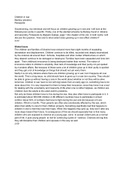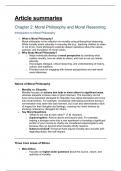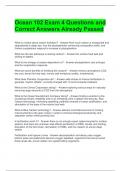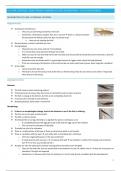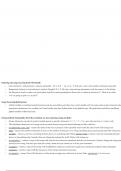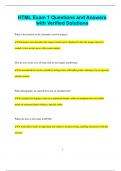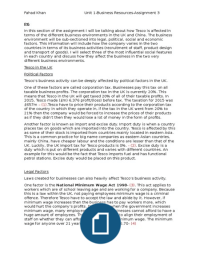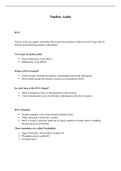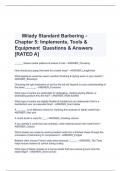Undue Influence
Undue influence exists where a contract has been entered as a result of pressure which falls
short of amounting to duress, the party subject to the pressure may have a cause of action
in equity to have the contract set aside on the grounds of undue influence.
Undue influence operates where there exists a relationship between the parties which has
been exploited by one party to gain an unfair advantage.
Where a contract is found to be entered into as a result of undue influence, this will render
the contract voidable.
RBS V Etridge
- "Undue influence is one of the grounds of relief developed by the courts of
equity as a court of conscience. The objective is to ensure that the influence of
one person over another is not abused. In everyday life people constantly seek
to influence the decisions of others. They seek to persuade those with whom
they are dealing to enter into transactions, whether great or small. The law has
set limits to the means properly employable for this purpose. The law will
investigate the manner in which the intention to enter into the transaction was
secured: If the intention was produced by an unacceptable means, the law will
not permit the transaction to stand. The means used is regarded as an exercise
of improper or 'undue' influence, and hence unacceptable, whenever the
consent thus procured ought not fairly to be treated as the expression of a
person's free will. It is impossible to be more precise or definitive. The
circumstances in which one person acquires influence over another, and the
manner in which influence may be exercised, vary too widely to permit of any
more specific criterion."
There are three classes of undue influence which were set out in the case of Bank of Credit
& Commerce International v Aboody [1990] (A husband exerted actual undue influence over
his wife in order to get her to sign a charge securing the family home on the debts owed by
the company in which the husband and wife owned shares. The couple were unable to repay
the mortgage and the bank sought to repossess the home. The wife sought to have the
mortgage set aside on the grounds that it was procured by actual undue influence of the
husband. The husband had exerted actual undue influence on the wife. However, the
transaction was not to the manifest disadvantage of the wife since she owned shares in the
company. In considering whether a transaction was to the manifest disadvantage the court
was to have regard to any benefits received in addition to the risks undertaken. Therefore
the bank were granted possession):
- Class 1 - Actual undue influence
- Class 2a - Presumed undue influence
- Class 2b - Presumed undue influence
, Class 1 –
Actual undue influence, as the name suggests, requires proof that the contract was entered
into as a result of actual influence exerted. The claimant must plead and prove the acts
which they assert amounted to undue influence.
This may include such acts as threats to end a relationship, continuing to badger the party
where they have refused consent until they eventually give in.
Williams V Bayley (Mr Bayley’s son forged his father’s signature on promissory notes and
gave them to Mr Williams. Mr Williams threatened Mr Bayley that he would bring criminal
prosecution against his son unless he granted an equitable mortgage to get back the notes.
House of Lords upheld the cancellation of the agreement, on account of undue influence).
Originally it was a requirement that the claimant seeking to find relief through actual undue
influence must also establish that they had suffered a manifest disadvantage
- BCCI V Aboody
However, it was held in CIBC Mortgages v Pitt [1994] that manifest disadvantage was not
required in cases of actual undue influence.
- CIBC Mortgages v Pitt [1994] (Mr Pitt wished to purchase some shares on the
stock market. He pressured his wife into signing a mortgage of £150,000
securing the family home. The stated purpose of the loan was to purchase a
holiday home and pay off the existing mortgage. The husband used the money
to purchase shares and then used those shares as collateral to purchase further
shares. For a time the shares did very well and he was a millionaire on paper.
The wife saw no benefit from these shares as any income was always used to
purchase more shares. In 1987 the stock market crashed. The bank sought to
enforce the security under the mortgage which at the time exceeded the value
of the home. The wife raised actual undue influence in defence. Held: Overruling
BBCI v Aboody - it is not necessary for a claimant to demonstrate manifest
disadvantage where a defence is based on actual undue influence. However, as
the transaction on its face did not seem to the manifest disadvantage of the
wife, because the stated purpose was to purchase a holiday home, the bank was
not put on enquiry and therefore could not be fixed with constructive notice).
Class 2a-
Under class 2a there is no requirement to prove that improper influence was actually
exerted. Instead it must be established:
1. There was a relationship which as a matter of law gives rise to a presumption of
undue influence
2. The transaction is one which can not readily be explained by the relationship of the
parties.
1) Relationships capable of giving rise to an automatic presumption under undue influence:
- Parent: child
- Solicitor: Client
- Religious advisor: disciple
- Doctor: Patient
- Trustee: beneficiary
Undue influence exists where a contract has been entered as a result of pressure which falls
short of amounting to duress, the party subject to the pressure may have a cause of action
in equity to have the contract set aside on the grounds of undue influence.
Undue influence operates where there exists a relationship between the parties which has
been exploited by one party to gain an unfair advantage.
Where a contract is found to be entered into as a result of undue influence, this will render
the contract voidable.
RBS V Etridge
- "Undue influence is one of the grounds of relief developed by the courts of
equity as a court of conscience. The objective is to ensure that the influence of
one person over another is not abused. In everyday life people constantly seek
to influence the decisions of others. They seek to persuade those with whom
they are dealing to enter into transactions, whether great or small. The law has
set limits to the means properly employable for this purpose. The law will
investigate the manner in which the intention to enter into the transaction was
secured: If the intention was produced by an unacceptable means, the law will
not permit the transaction to stand. The means used is regarded as an exercise
of improper or 'undue' influence, and hence unacceptable, whenever the
consent thus procured ought not fairly to be treated as the expression of a
person's free will. It is impossible to be more precise or definitive. The
circumstances in which one person acquires influence over another, and the
manner in which influence may be exercised, vary too widely to permit of any
more specific criterion."
There are three classes of undue influence which were set out in the case of Bank of Credit
& Commerce International v Aboody [1990] (A husband exerted actual undue influence over
his wife in order to get her to sign a charge securing the family home on the debts owed by
the company in which the husband and wife owned shares. The couple were unable to repay
the mortgage and the bank sought to repossess the home. The wife sought to have the
mortgage set aside on the grounds that it was procured by actual undue influence of the
husband. The husband had exerted actual undue influence on the wife. However, the
transaction was not to the manifest disadvantage of the wife since she owned shares in the
company. In considering whether a transaction was to the manifest disadvantage the court
was to have regard to any benefits received in addition to the risks undertaken. Therefore
the bank were granted possession):
- Class 1 - Actual undue influence
- Class 2a - Presumed undue influence
- Class 2b - Presumed undue influence
, Class 1 –
Actual undue influence, as the name suggests, requires proof that the contract was entered
into as a result of actual influence exerted. The claimant must plead and prove the acts
which they assert amounted to undue influence.
This may include such acts as threats to end a relationship, continuing to badger the party
where they have refused consent until they eventually give in.
Williams V Bayley (Mr Bayley’s son forged his father’s signature on promissory notes and
gave them to Mr Williams. Mr Williams threatened Mr Bayley that he would bring criminal
prosecution against his son unless he granted an equitable mortgage to get back the notes.
House of Lords upheld the cancellation of the agreement, on account of undue influence).
Originally it was a requirement that the claimant seeking to find relief through actual undue
influence must also establish that they had suffered a manifest disadvantage
- BCCI V Aboody
However, it was held in CIBC Mortgages v Pitt [1994] that manifest disadvantage was not
required in cases of actual undue influence.
- CIBC Mortgages v Pitt [1994] (Mr Pitt wished to purchase some shares on the
stock market. He pressured his wife into signing a mortgage of £150,000
securing the family home. The stated purpose of the loan was to purchase a
holiday home and pay off the existing mortgage. The husband used the money
to purchase shares and then used those shares as collateral to purchase further
shares. For a time the shares did very well and he was a millionaire on paper.
The wife saw no benefit from these shares as any income was always used to
purchase more shares. In 1987 the stock market crashed. The bank sought to
enforce the security under the mortgage which at the time exceeded the value
of the home. The wife raised actual undue influence in defence. Held: Overruling
BBCI v Aboody - it is not necessary for a claimant to demonstrate manifest
disadvantage where a defence is based on actual undue influence. However, as
the transaction on its face did not seem to the manifest disadvantage of the
wife, because the stated purpose was to purchase a holiday home, the bank was
not put on enquiry and therefore could not be fixed with constructive notice).
Class 2a-
Under class 2a there is no requirement to prove that improper influence was actually
exerted. Instead it must be established:
1. There was a relationship which as a matter of law gives rise to a presumption of
undue influence
2. The transaction is one which can not readily be explained by the relationship of the
parties.
1) Relationships capable of giving rise to an automatic presumption under undue influence:
- Parent: child
- Solicitor: Client
- Religious advisor: disciple
- Doctor: Patient
- Trustee: beneficiary



